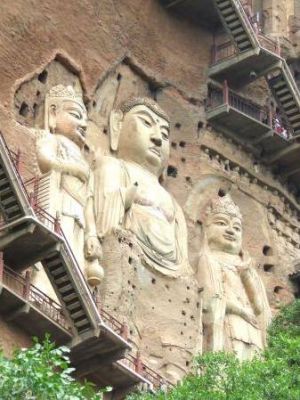Difference between revisions of "Maijishan Grottoes"
From Wiki China org cn
imported>Superleila m |
imported>Ciic |
||
| Line 1: | Line 1: | ||
| + | [[File:Maijishan Grottoes.jpg|thumb|Maijishan Grottoes, Gansu]] | ||
| + | |||
[[Mount Maiji]], 35 km southeast of [[Tianshui]] City, has 194 extant caves and niches containing over 7,000 stone, clay, and clay-on-stone statues, plus 1,000 sq. m of murals. It is reputed as "the largest museum of clay sculptures in the East." | [[Mount Maiji]], 35 km southeast of [[Tianshui]] City, has 194 extant caves and niches containing over 7,000 stone, clay, and clay-on-stone statues, plus 1,000 sq. m of murals. It is reputed as "the largest museum of clay sculptures in the East." | ||
The extant statues in the '''Maijishan Grottoes''' are of the Buddha, Goddess of Mercy and others. Some of them were made in the early period of grotto building in [[China]] and show a strong influence of Western Regions' statuary art, both in the images and dress. One typical example is the Buddha on the front wall of Cave 78. Statues sculpted after the Northern Wei period show less and less foreign influence and stronger and stronger Chinese and regional features. | The extant statues in the '''Maijishan Grottoes''' are of the Buddha, Goddess of Mercy and others. Some of them were made in the early period of grotto building in [[China]] and show a strong influence of Western Regions' statuary art, both in the images and dress. One typical example is the Buddha on the front wall of Cave 78. Statues sculpted after the Northern Wei period show less and less foreign influence and stronger and stronger Chinese and regional features. | ||
| − | |||
| − | |||
[[category:tourism]] | [[category:tourism]] | ||
Revision as of 08:18, 26 July 2016
Mount Maiji, 35 km southeast of Tianshui City, has 194 extant caves and niches containing over 7,000 stone, clay, and clay-on-stone statues, plus 1,000 sq. m of murals. It is reputed as "the largest museum of clay sculptures in the East."
The extant statues in the Maijishan Grottoes are of the Buddha, Goddess of Mercy and others. Some of them were made in the early period of grotto building in China and show a strong influence of Western Regions' statuary art, both in the images and dress. One typical example is the Buddha on the front wall of Cave 78. Statues sculpted after the Northern Wei period show less and less foreign influence and stronger and stronger Chinese and regional features.
